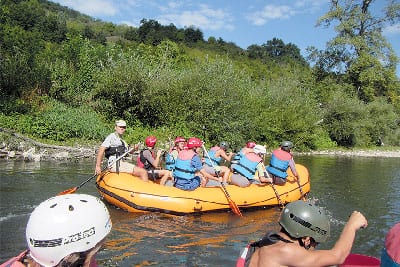The International School of Belgrade this year commemorates 70 years of providing high-quality international education. Thousands of children, representing diverse cultural and national backgrounds, and sharing a commitment to, and passion for, learning, have passed through the portals of knowledge at ISB
By facing up successfully to the challenges posed by outdoor activities, youngsters gain the possibility to take major strides in all aspects of their own development, building confidence, overcoming fears and apprehensions etc.
The International School of Belgrade (ISB) currently offers ‘experiential’ or ‘active’ learning opportunities at the Upper School.
What is this type of learning and how does it bring added value to your curriculum?
 – Active learning, by definition, requires that students share in the experience of learning. Outdoor education refines this focus to include authentic learning outside of school, where the environment itself is also part of the inquiry. ISB’s Trip Week excursions take place in a variety of environments: both local and international, rural and urban, familiar and even remote locations.
– Active learning, by definition, requires that students share in the experience of learning. Outdoor education refines this focus to include authentic learning outside of school, where the environment itself is also part of the inquiry. ISB’s Trip Week excursions take place in a variety of environments: both local and international, rural and urban, familiar and even remote locations.
During all trips, students and adults share in a wide range of learning experiences. These include skills-focused activities, problem-solving tasks, team building and self-reliant learning, with the ‘residential’ or overnight experience being of special value to young students.
The Expedition Trips (grades 6-10) purposefully align with the concept of outdoor education, whereby participants follow an itinerary that includes adventurous activities on land and water, and some with an environmental focus.
How does outdoor education support holistic student growth?
 – Most parents would automatically recognise that outdoor education provides a major contribution to both physical and environmental education, and can also enhance many other curriculum areas.
– Most parents would automatically recognise that outdoor education provides a major contribution to both physical and environmental education, and can also enhance many other curriculum areas.
However, many might not be aware of the fact that it also contributes to personal growth and social awareness, which ultimately helps young people develop the skills needed for life and the world of work. Outdoor education does this by providing valuable alternatives and, most importantly, non-competitive activities for achieving social-emotional development in the formative years, in which all students can participate.
What are some skills and learning dispositions that outdoor education nurtures in youngsters, in order to prepare them for their later studies and the world of work?
– As a single, value-added package of learning opportunities, experiential learning is unrivalled.
To quote the English Outdoor Council, “Challenging outdoor experiences promote the development of communication, problem solving and decision-making skills, which have currency across a range of occupations.
They encourage a positive “opting in” and “can do” attitude. Young people’s horizons are broadened, new challenges come to be relished rather than shunned, and perseverance and determination are reinforced.
Values and attitudes developed in a context of shared endeavour help to form a sound basis for responsible citizenship”.
It is my hope to see Outdoor Education grow at ISB, given that environmental education benefits students, schools and the wider world.